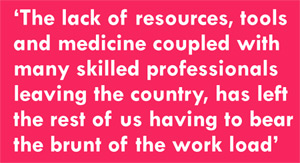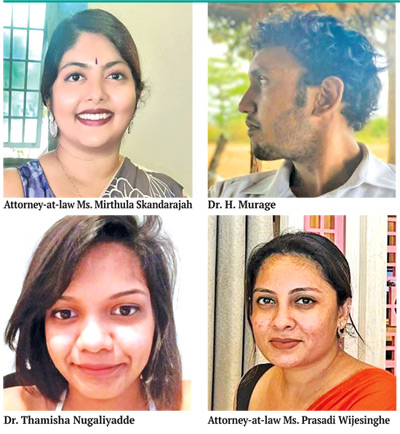
Amid the serious economic crisis, we as a nation are wedged in, the young professionals of our country who once may have had a clear and promising future, may have started to feel insecure and rather uncertain about their careers, and their lives.

The ‘Youth Observer’ will deep dive into various professional fields and try to understand the concerns of young professionals in this crisis. We will speak to them about their concerns, worries and try to learn from their inspirations.
 This week we reached out to a few outstanding individuals, young professionals in Sri Lanka’s healthcare/medical sector and the legal sector. Dr. H. Murage and Dr. Thamisha Nugaliyadde and Attorneys-at- law, Ms. Mirthula Skandarajah and Ms. Prasadi Wijesinghe.
This week we reached out to a few outstanding individuals, young professionals in Sri Lanka’s healthcare/medical sector and the legal sector. Dr. H. Murage and Dr. Thamisha Nugaliyadde and Attorneys-at- law, Ms. Mirthula Skandarajah and Ms. Prasadi Wijesinghe.
In conversation with our professionals here’s what we found out:
Do you feel like your pay and your skillset and experience is compatible?
Dr. Nugaliyadde said the pay is insufficient to cover the basic needs let alone the lifestyle that we were once used to, but it the nature of working in a country struck by an economic crisis.
Do you feel secure in your job?
Ms. Skandaraja said, “I belong to the fortunate minority who can confidently say yes. I think this is because I am part of a small team that works for a senior President’s Counsel. If I was practicing solely on my own, I am sure I would be struggling to secure a fee-paying clientele because litigants are unable to maintain their families and afford legal fees.”
Have you had to alter your experience, skillset to cope with these times in your filed?
Ms. Wijesinghe and Ms. Skandaraja believe that while they had to take up the challenge and learn mire due to the prevelaining situation of the country they saw this as an opportunity to grow and tests themselves. Ms. Skandaraja told us how she had to manage her expectations of branching out on her own and taking up her own cases due to restrains the crisis has put on her, Ms. Wijesinghe added that while she has not had to greatly alter her skillset, “due to other people leaving their employment in my division, I expanded myself and made myself available for the tasks which I was not originally assigned to in my employment contract”.
The doctors said that they had to adapt to work with limited resources and limited man power. “In a short period we had to learn different skills, manage with the scarcity of resources and adjust to a new normal, it was immensely challenging yet rewarding,” said Dr. Murage.
How do you think healthcare sector effected by Covid?
Dr. Nugaliyadde and Dr. Murage said the Government struggles with basic health care needs of the patients, depleted drug supplies.
Dr. Murage added, “While there is also a scarcity for screening tools for Covid-19, the challenge is to manage it with the economic issues that have developed. The healthcare sector tries to maintain the health practices imposed during the first Covid outbreak, however, people have bigger problems now, so it is definitely an issue.
How has the Covid-19 experience effected the legal profession?
Ms. Wijesinghe and Ms. Skandaraja mentioned various drastic changes that has had both good and bad impacts on the justice system. Ms. Skandaraja said that it affected the average person’s ability to come to court, imposed strict time limits prescribed by law for various things like filing a special leave application or an FR application really limited the people’s ability to come before court and also compromised the rights of accused persons to the extent that they are unable to communicate with a counsel as prisons were closed to the public.
On the other hand Ms. Wijesighe pointed out that a positive outcome of this situation is that People understood almost everything can be done through virtual platforms, from negotiations to consultations to regulatory submissions to contract executions (except for notarize documents) and even court hearings .
Are you experiencing brain drain and how are you coping with it?
Dr. Nugaliyadde and Dr. Murage informed us that the lack of resources, tools and medicine coupled with many skilled professionals leaving the country, has left the rest of us having to bear the brunt of the work load. “It has taken a toll on mental health of youngsters seeing the state of the country and the depleting state of our future,” said Dr. Nugaliyadde.
Ms. Wijesinghe and Ms. Skandaraja were of the opinion that many young professionals leaving would have serious impact, these would be felt much later. They believed so because the legal profession is one in which hierarchy plays a huge role.
“There are traditions that have become unspoken rules. At present, there are legal giants in every branch of law that keep the profession alive, however, eventually there will come a time where the brain drain will be felt when those seniors are unable to pass on the mantle to the next generation.”
What are the precautions that have been taken to mitigate the issue?
While there doesn’t seem to be solid, viable solutions in place, our professionals did not believe there are specific precautions to be taken. The doctors believed that the best way to mitigate this issues is acceptance and finding ways to keep yourselves occupied and happy.
What are the new opportunities available in the legal spheres amidst the present crisis?
Ms.Wijesinghe believed that new opportunities may arise in the fields of sustainable energy, telecommunication and industries relating to technology.
Ms. Skandaraja said, “As far as being a criminal law practitioner is concerned, recent amendments to law have created some opportunities for younger counsel to shine. I refer specially to the amendment to the Poison Opium and Dangerous Drugs ordinance which now stipulates that if the quantity of drugs exceeds 10 grams, applications for bail must be filed in the Court of Appeal (the High Court had jurisdiction prior to amendment).”
How competitive is the healthcare sector outside Sri Lanka?
Dr. Nugaliyadde and Dr. Murage were of the opinion that are many opportunities and upcoming innovations with proper funding to execute it, however it is extremely competitive as many skilled individuals are trying to get into these opportunities and however much we would like to believe, leaving to another country right now may not guarantee a care free life as the entire world economy was effected by the global pandemic.
What are the opportunities in the legal sector outside of Sri Lanka?
Ms.Skandaraja said, “the law differs from jurisdiction to jurisdiction therefore, any Attorney-at-Law traveling from Sri Lanka to another country might most likely have to start from scratch - that is, study for the Bar Exam in that country, take the exam and do an apprenticeship prior to obtaining license to practice. Therefore, this is not an industry which provides for flexibility. However, the fact that young professionals in this industry are willing to take the risk of not being employed / starting from scratch shows how dire the situation of the country currently is”.
Do you think based on experience, everyone get similar or better opportunities in overseas?
Ms.Wijesinghe was of the opinion that experience is not the only thing that matters when it comes to job opportunities in overseas. Education qualifications, professional qualifications, and sometimes connections could play a major role as well.
Dr. Nugaliyadde said, “I would like to say yes, even though it may seem as a struggle in the beginning, the skills are identified and there is potential to be recognized”.
What is the risk of leaving the country without a secure plan?
Dr. Nugaliyadde and Dr. Murage believed that the entire world is struggling in their own way at this point of time and leaving for the sake and hope of escaping would not get you anywhere. While it is very competitive out there it is important to acquire the proper skills and experience and set out a proper plan for the future of your career before taking off.
Ms. Wijesinghe stated that, while no one should leave the country, leaving a permanent job behindwithout a feasible plan, no job is secured in Sri Lanka given the economic climate. She added that, “Economists have anticipated that many companies will be shut down or downsized due to recession. Private practitioners complains about clients defaulting. On top of all these, a tax system is implemented which does not give a benefit to the tax payer in return. Given these circumstances, professionals tend to leave their respected jobs in SL for odd jobs in other countries.”
Do you have a message for young generation, to cope up with these tough times?
Our professionals believed that, the best advice they can give is to hang in there.
Ms. Wijesinghe and Ms. Skandaraja said that it is best to use these troubled times as a learning curve. To analyze the issue and check the possibilities to minimize the adverse impact.
Dr. Nugaliyadde and Dr. Muragewas of the opinion that exploring your options and keeping an open mind might help a lot. “Make sure you are passionate enough to endure the challenges thrown to you by your career and make sure you are aware of the lifestyle you are getting into before taking a serious decision about your career.”
